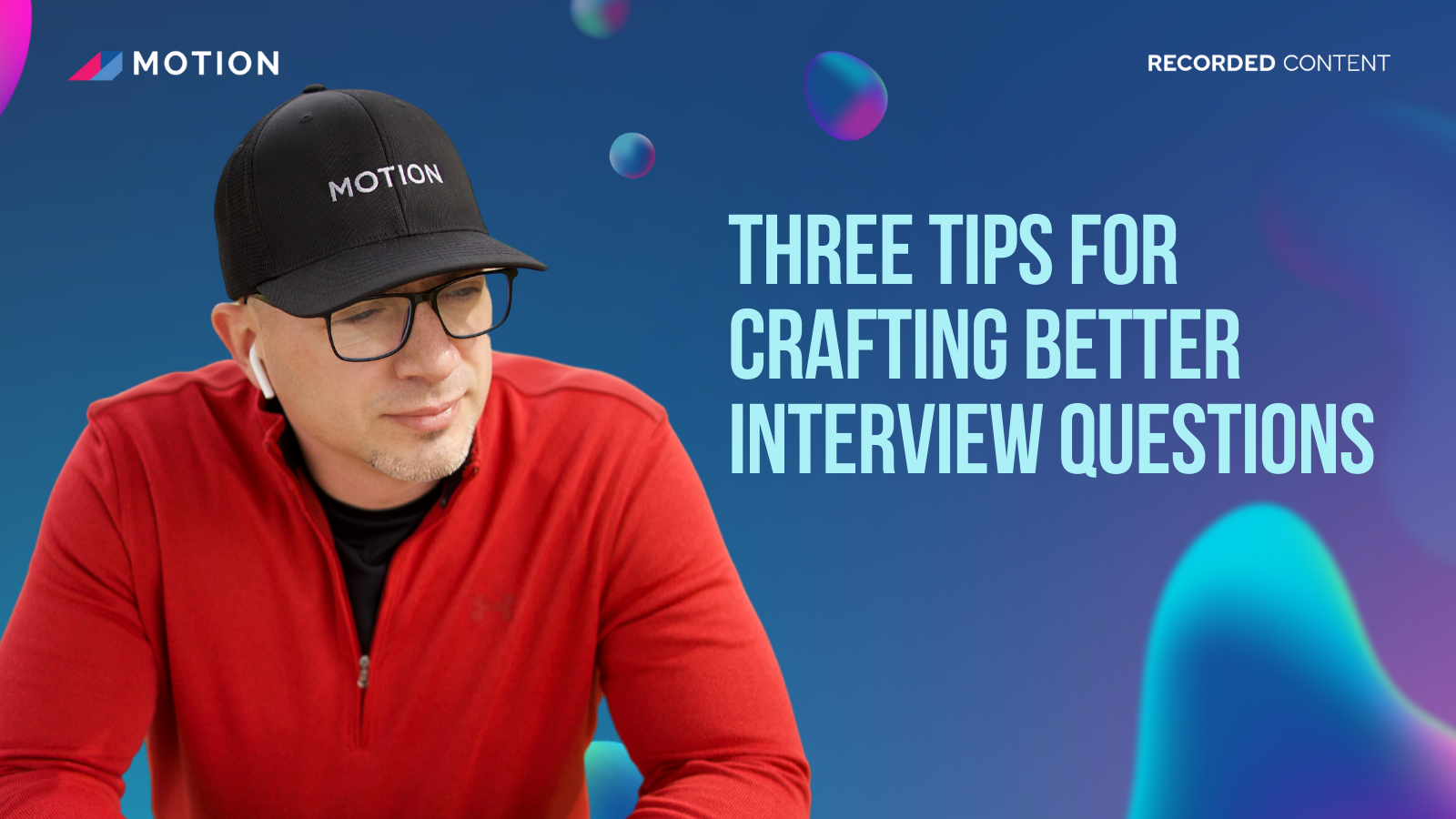As a business podcast host, one of your main goals is to create engaging and informative conversations with your guests. You want each guest to feel like they had a unique experience on your company’s show.
A key component to better and more interesting conversations is asking the right questions. By choosing the right questions, you can draw out your guests’ best stories, insights, and expertise, creating a more interesting and valuable experience for your listeners (or viewers…if you also produce a video podcast).
But with so many different types of questions to choose from, it can be overwhelming to know where to start. That’s where this article comes in. In this blog post, we’ll explore 8 different categories of podcast interview questions that you can use to help get the most out of your guests. From personal background questions to industry-specific prompts, these categories will provide you with a wide range of options to draw out interesting and informative conversations.

Whether you’re just starting out with your business podcast or you’re looking to improve your interviewing skills, this guide helps provide a foundation for engaging and memorable conversations with your guests.
Here’s a breakdown of the 8 types of business podcast interview questions that you can use to help draw out your guests’ best stories:
- Personal background questions
- Professional experience questions
- Industry-specific questions
- Personal growth and development questions
- Future-focused questions
- Current events or news-related questions
- Personal interests or passions
- Controversial or thought-provoking questions
Personal background questions
Personal background questions are a great way to establish a more personal connection with your guests and help to create a more engaging and interesting conversation. These types of questions focus on your guest’s upbringing, education, and personal history, providing context and background information that can help your listeners to get to know your guest on a deeper level.
When it comes to business podcasts, personal background questions can be particularly useful for helping to establish your guest’s credibility and expertise. For example, asking about their education and career path can help to highlight their relevant experience and knowledge, and can help to establish them as a subject matter expert in their field.
Personal background questions can also be a great way to create a more human and relatable connection with your listeners. By asking about your guests’ hobbies, interests, and personal experiences, you can help to create a more personal and engaging conversation that your listeners can relate to.
Some examples of personal background questions that you might consider using in your podcast interview include:
- Where did you grow up and why did you decide to go to [specific college/university]?
- What did you study in school, and why did you choose that field?
- What was the spark that first got you interested in your current industry?
- Who was the most influential person during the early stages of your career?
- When you’re not busy doing [current role], what’s your favorite thing to do?
- What’s something that most people don’t know about you?
Overall, personal background questions can be a great way to create a more personal and engaging conversation with your guests and help to create a more memorable and valuable experience for your listeners. Your guests become more than a LinkedIn profile and you help connect their personal attributes to a broader story for your listeners.

“With a podcast script, you give yourself more confidence heading into the recording session.”
Justin Brown
Co-Founder
Motion
Professional experience questions
Professional experience questions help provide more context for your podcast listeners. These types of questions focus on your guest’s professional background and expertise, providing insight into their industry and helping to establish their credibility as a subject matter expert.
When it comes to choosing professional experience podcast interview questions, it’s important to consider the specific goals of your interview and the information that your listeners are most interested in. For example, if you’re interviewing an entrepreneur, you might ask about their business journey and the challenges and successes they’ve experienced along the way. If you’re interviewing a subject matter expert, you might ask about their specific area of expertise and the trends and developments they’re seeing in their field.
With an interview-style podcast, professional experience questions help you cut out the b.s. and paint a picture for your target audience. By asking about real experiences and continuing with follow-up questions, you get a better understanding of why a guest believes in certain things.
Here are some examples of professional experience interview questions to ask:
- Can you tell us what you’re most responsible for in your current role?
- How is your performance measured in your current role?
- What’s the biggest challenge you faced when you transitioned to your latest role?
- What have you struggled with the most while operating in your current role?
- What’s the most common challenge your team encounters on a day-to-day basis?
- What’s the first step you’d suggest for people looking to enter your field?
- What’s been the biggest surprise while operating in your current role over the last six months?
- Before you started [something your guest does now], what was your approach before?
- What prompted you to take a different path and find a better solution for doing [specific example]?
Overall, professional experience questions are valuable for podcast hosts because they help connect the dots between your audience’s challenges and your podcast guest’s background.

“MYTH: The podcast host’s job is to ask a question and get out of the way.”
Joe Ferraro
Founder
Damn Good Conversations
Industry-specific questions
Industry-specific questions are a great way to delve deeper into your guest’s field of expertise and create a strong connection with your specific audience. These types of questions explore the specific challenges and opportunities faced by both your guest and podcast audience.
When it comes to choosing industry-specific questions for each podcast guest, it’s important to consider the objective of your conversation and the specific conflict you’re exploring. The conflict can really help shape a lot of the questions you ask podcast guests.
Some examples of industry-specific interview questions that you might consider using in a conversation include:
- Can you provide an overview of the biggest challenge facing your industry right now?
- What are some of the most interesting developments in your industry within the last few months?
- How have you seen technology or other trends impact your industry in the last year?
- What are some of the most innovative or exciting projects that you’ve been a part of in your industry over the last year?
- What do you think other industry leaders are really paying attention to right now?
- What are some of the key skills or knowledge that are most important for success in your industry in the next few years?
Industry-specific questions help you explore topics that are highly relevant to your audience and are based on the unique point of view of your podcast guest. These types of questions ensure your podcast episode is relevant and help your audience.
Personal growth and development questions
Personal growth and development questions are the best podcast interview questions to help inspire and motivate your listeners. They tap into your guests’ journey over a period of time and help you tell a story.
When it comes to crafting personal growth and development questions for your guest interview, it’s important to determine the story you want to tell. Do you want to uncover the most significant turning point in someone’s career? Or, do you want to highlight the actions your podcast guest took to overcome a specific challenge?
Once you determine the story, you can create a set of questions to get the foundation of the story. Then, based on your guest’s responses, you can build in more follow-up questions during the actual conversation.
Here are some personal growth and development question ideas that you might consider using:
- How do you continue to learn and grow in your career?
- What communities do you rely upon to help with career growth?
- What’s an example of when you really struggled in a role…and what did you do to get out of the situation?
- What are some habits or practices that you’ve found to be most helpful for personal and professional growth?
- Can you describe a time when you felt your career growth stalled and what you did to change it?
- How do you stay motivated and inspired in your work?
- What are your “go-to” resources for growing as a professional?
- When you lose inspiration in your role, how do you get it back?
- How do you balance your personal and professional commitments?
Personal growth and development questions can be a great foundation for a guest’s story. These types of questions are designed to uncover how your podcast guest navigates their career and helps your audience get inspiration for their own situation.
How can your company become a thought leader?
What does it really mean to be a thought leader in B2B? The Notorious Thought Leader is a podcast for B2B marketers who want to generate demand by creating content that builds credibility and thought leadership. In each episode, Erin Balsa helps demystify thought leadership and uncovers how marketing leaders & CEOs are using thought leadership to generate demand.
Future-focused questions
Future-focused questions are a great way to provide a glimpse into the future and spark interesting and thought-provoking discussions with your guests. These types of questions help to explore what’s next for your guest and their industry and can help generate interesting topics for your audience.
Future-focused questions also help develop thought leadership. When you ask guests about their perspectives on the future, it opens up the opportunity for you, as a podcast host, to provide your own perspective. This type of dialogue helps position the guest and the host as thought leaders.
Here are some specific future-focused questions that you might consider using in your interview podcasts:
- What are your long-term goals or aspirations for your career?
- What are some of the biggest opportunities that you see on the horizon for your industry?
- What are some of the trends or developments that you think will shape the future of your industry?
- How do you see your role or your company evolving in the next 5-10 years?
- What are your predictions for the future of your industry, and how do you plan to stay ahead of the curve?
- What advice do you have for people looking to stay relevant and successful in their careers in the long term?
Nobody really knows what the future holds. And future-focused questions can be a great way to provide a glimpse into the future while also creating thought-provoking discussions with your guests.
Current events or news-related questions
Current events or news-related questions help you tackle challenges faced by your listeners…right now. These types of questions help explore the most pressing issues on the mind’s of listeners while also tapping into the perspectives of your guest.
Asking about current news stories can help keep your podcast content timely and up-to-date, which can be especially important in fast-moving industries or fields. If you tackle current issues frequently, then you can start to build credibility with your audience and become a “go-to” resource.
Here are some examples of podcast questions that focus on current events or news-related topics:
- Can you provide your perspective on the current state of your industry?
- How is [major current event] impacting your industry or business?
- Why is [the latest trend] creating waves in the industry?
- What is so hard about handling [the latest trend]?
- What new opportunities exist in your industry, considering [the latest trend]?
- What are your thoughts on [the latest trend] in your industry?
- How do you see [the latest trend or event] shaping the future of your industry or business?
- What are your predictions for the future based on [the latest trend]?
- What is your business doing differently considering the recent changes with [the latest trend]?
- How do you stay up-to-date on current events or news stories that are relevant to your industry?
Overall, current events or news-related questions can be a great way to stand out with listeners. Rather than always providing evergreen material, your show can be a trusted source of highly topical information.
Personal interests or passions
Personal interest questions are a great way to provide a more well-rounded view of your guest and help create a deeper interview experience. These types of questions can help to explore your guest’s hobbies, interests, and passions outside of their professional life, and can help build more rapport with your guest.
From my perspective, a great interview doesn’t start with a laundry list of questions about someone’s hobbies. Instead, I think it’s important to sprinkle in these types of podcast interview questions during the natural conversation flow.
When a podcast host connects a guest’s personal life with business objectives, it helps provide a unique conversation for listeners. Often, you get to tackle topics that other podcast hosts don’t.
Here are some question ideas to help bring out more personal interests from guests:
- What is your favorite thing to do outside of work?
- How do you like to spend your free time?
- What do you enjoy reading when you are on the beach?
- What area of your personal life influences your work?
- How do you balance your personal and professional commitments?
- What have you learned in business that’s helped you become a better person?
- What are some of the most rewarding or meaningful experiences you’ve had outside of your professional life?
- When you’re at a party and are given 60-seconds, what personal story do you tell?
When you tap into someone’s personal life, you humanize your guest a bit more and create a deeper connection with the audience. Personally, I enjoy learning from a guest’s professional and personal experiences — it just makes their perspectives seem more authentic.
Want to see how other B2B marketers craft interesting questions?
Recorded Content is a show for small, scrappy marketing teams who are looking to launch & grow a successful B2B podcast. In each episode, we provide stories on how to overcome the challenges of launching, running and growing a show. We tackle issues with technology, content marketing, distribution and more. We help you become a B2B podcasting hero with an amazing show.
Controversial or thought-provoking questions
If you spend any time on social media, especially LinkedIn, you’ll see how polarizing opinions lead to higher engagement.
But how do you get these provocative perspectives during a podcast interview?
You have to ask your podcast guests controversial or thought-provoking questions and seek out the answers. The secret though, from my perspective, is to dig deeper. You don’t want to let your podcast guest off the hook with a simple quote. You have to ask follow-up questions and get more context.
Some examples of controversial or thought-provoking questions that you might consider using in podcast interviews:
- What are your thoughts on [controversial or divisive topic] in your industry?
- There’s a group of people in the industry that believe in [controversial topic], how do you feel?
- What helped shape your opinion on [controversial topic]?
- Why is [controversial topic] so controversial? Why do you feel it’s created such an uproar?
- How is your team handling [controversial topic] today?
- How do you handle disagreement or conflicting viewpoints about [controversial topic]?
If you want more polarizing responses to questions, then you have to ask the hard questions. And when you get an answer from your podcast guest, make sure to follow-up and get a full understanding of their position. After all, that’s what is so great about podcasting — the healthy dialogue.
Use different categories of podcast interview questions to get the best answers from guests
It’s clear that asking great podcast interview questions is key to creating engaging and informative conversations with your guests. By choosing questions that are tailored to your goals and your audience’s interests, you can draw out your guests’ best stories, insights, and expertise, creating a more valuable and memorable experience for your listeners.
One key to choosing the right questions is to consider your guest’s expertise and experience, and to craft questions that are relevant to them. This can help to provide valuable and specific insights for your listeners, and can help to establish your guest as a credible and knowledgeable source of information.
Another important factor to consider is the level of personal connection that you want to create with your guests. Asking personal background or personal interests questions can help to create a more personal and relatable connection with your listeners.
Finally, don’t be afraid to ask controversial or thought-provoking questions if they are relevant to the theme of your company’s show. These types of questions can help get polarizing perspectives with more context.

Written by Tristan Pelligrino
Tristan Pelligrino is the Co-Founder of Motion. He’s a serial entrepreneur who started his career as a consultant with large IT companies such as PwC, IBM and Oracle. After getting his MBA, he started and grew one of the fastest video production companies in the country – which was listed on the Inc. 5000. Tristan now enjoys leading the content marketing strategies of some of the most innovative B2B technology companies in the country. You can find him on LinkedIn and Facebook.


